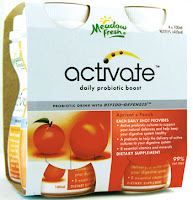
Good Bacteria: How Probiotics Can Boost Your Internal Health
By Brenda
Many medical health care professionals claim antibiotics to be 'the lifesaving drugs' of the twentieth century. No doubt, antibiotics are the most widely used and the most talked about class of drugs ever used, on the vast majority of people and animals, across the globe. What does the term antibiotics actually mean though?
Here is Wikipedia's definition of the word term meaning for antibiotic. An antibiotic is a chemotherapeutic agent that inhibits or abolishes the growth of micro-organisms, such as bacteria, fungi, or protozoans. Antibiotic is now used to refer to substances with anti-bacterial, anti-fungi, or anti-parasitical activity.
Antibiotic's widespread overuse has recently been questioned over the last decade, by many concerned health care experts, due to their apparent, and oftentimes, ineffectiveness. And, many health care scientists are also beginning to recognize the fact that, unfortunately, not all the bacteria that dwells inside our bodies aim to harm us.
Antibiotics do perform a sometimes useful function in killing off large numbers of harmful bacteria in our bodies that can lead to life threatening infections. It is a self sacrificing trade-off, however, as there is no discrimination between the chemotherapeutic killing off of all bacteria, whether it be good or bad germs, in the gastrointestinal tract.
Since the 1940's, modern medicine has mainly focused on the killing off of harmful disease causing bacteria via newly discovered antibiotics. This practice came about with not much understanding of the role, in the advantages, that good micro-organisms (bacteria) played in maintaining good health.
Good bacteria (probiotics), is a modern new term used to describe live, beneficial organisms (bacteria) which, when taken in adequate and consistent amounts, offers many different health benefits to the host. Two very subtle improvements are often noticed right away, in a stronger immune system and a healthier digestive tract.
"Probiotics is not a fad," says Gary Huffnagle, an immunologist at the University of Michigan and author of "The Probiotics Revolution." It is really is a new scientific understanding about how the body works."
Do an internet search on the word term 'probiotics' and you will find that there has definitely been a shift, now days, in the way medical scientists think about bacteria (germs). It is finally getting a much deserved, more focused awareness and attention than ever before.
Probiotics have been found to aid with the absorption of nutrients, production of vitamin K, and helps with the necessary and balanced maintenance of good bacteria in the intestines. They are also believed to inhibit the overgrowth of disease causing harmful bacteria, by crowding them out. Probiotics can be the most helpful to those who have just recently taken antibiotics, by re-establishing colonies of good bacteria in the gastrointestinal tract which, sometimes, can be quite difficult to do.
The best sources of good bacteria (probiotics) comes from fermented foods, beverages, or supplements. Probiotic supplements are available in many health food stores either in capsules, powders, or liquid forms. And, while many nutritional experts agree that most of us would benefit in some way from a daily dose of probiotics, learning how to ferment your own foods or beverages at home is a more superior source of good bacteria nutrition. Not all probiotic supplements can necessarily be trusted to deliver what they say they can.
Besides, learning to ferment your own food and beverages at home can be a healthy, fun, and nutritious hobby. Most experts on this subject will agree, that anything you can easily make at home is far better for you than any commercialized product that you could buy. The reasoning behind this idea, is that you will have more control over the whole process in what you are ingesting, and you also have the option of buying the most natural ingredients to use for the end product.
Here is a small list (there are many more that are not listed) of different types of fermented foods and beverages:
1.yogurt
2.aged cheeses
3.kefir
4.kombucha
5.pickles and olives
6.sauerkraut
7.sourdough bread
8.soy sauce
9.vinegar
Studies have shown that good bacteria can help protect us from diarrhea, colitis, urinary tract infections, irritable bowel syndrome, and Chron's disease. Probiotics may also help treat kidney infections and stones, ulcers, and allergies. Some even argue that good bacteria can help protect us from cancer, colds and flu, and help lower cholesterol.
All-in-all, probiotics have been reported to help many different health conditions, from diabetes to migraine headaches. And to think, that as a culture, we have been overly obsessed with killing germs all around us by bleaching and soap washing everything in sight.
We are just now beginning to understand that there are certain types of germs, or bacteria, that are actually good for us, and they are our friends. Will our awareness of this knowledge benefit human health in the long term, I believe so.
No comments:
Post a Comment